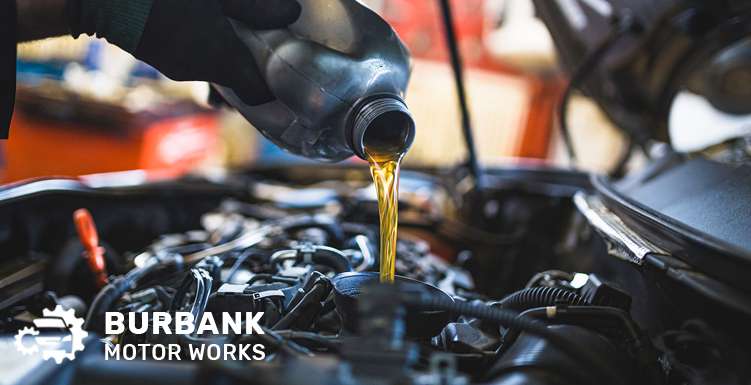
Address: 2208 W Burbank Blvd, Burbank, CA 91506

Mon - Fri: 7:45 Am - 5:30 Pm
Sat: 8:00 Am - 2:30 Pm
Sun: Closed
We'll Be Closed This Sunday – April 20th

Address: 2208 W Burbank Blvd, Burbank, CA 91506

Mon - Fri: 7:45 Am - 5:30 Pm
Sat: 8:00 Am - 2:30 Pm
Sun: Closed
An essential aspect of car maintenance in Burbank is regular oil changes. Keeping track of when to change your car’s oil can be daunting, yet it’s integral for your vehicle’s smooth operation and longevity. Burbank Motor Works is committed to providing top-notch repair and tire services, including timely oil changes.
The frequency of oil changes depends on several factors, including the engine oil you use, your driving habits, and the specific conditions you drive in. While older cars might need an oil change every 3,000 miles (4,500 kilometers) or three months, newer models with advanced engine designs can often go between 7,500 to 10,000 miles (11,000 or 15,000 kilometers) before needing another change.
This guide will delve into the importance of oil changes, different types of engine oils, and the recommended oil change intervals for both older and newer cars, providing you with all the information you need to ensure your vehicle is in optimal condition.

Engine oils play a crucial role in your vehicle’s performance and longevity. They lubricate the engine’s moving parts, minimize friction, and prevent overheating, ensuring your car runs smoothly and efficiently. However, not all engine oils are created equal. Several engine oils are available on the market, each with unique characteristics and benefits.
The most common engine oil is conventional motor oil or mineral oil. It is derived from crude oil, a natural resource. This type of oil is suitable for many light-duty, late-model cars with a simple engine design, making it a cost-effective choice for many drivers. However, conventional oil breaks down faster under extreme heat than its synthetic counterparts. Therefore, frequent Burbank oil changes are required, especially when driving under severe conditions.
High-mileage engine oil is designed specifically for vehicles with over 75,000 miles on the odometer. It contains additives that help reduce engine wear and tear, prevent leaks, and improve overall performance. This type of oil is an excellent option for older cars, as they tend to have more internal engine wear that conventional oils might need to handle adequately.
Synthetic motor oil is manufactured using chemical compounds to mimic the properties of conventional oils. It offers a more stable and consistent performance than traditional oils, making it an excellent choice for high-performance vehicles and extreme driving conditions. Synthetic oil has a longer lifespan and can go longer between oil changes.
Synthetic blend motor oil is a combination of conventional and synthetic oils. It offers some of the benefits of synthetic oil, such as improved protection and longer lifespan, at a lower cost than pure synthetic oil. It’s suitable for drivers looking for better performance without breaking the bank.
For older vehicles, the oil change intervals can vary based on the type of oil used, driving conditions, and the specific model of the car. However, a general rule of thumb suggests an oil change every 3,000 miles or 3 months, whichever comes first. This recommendation is based on the fact that older engines may not run as efficiently as newer ones, leading to quicker oil degradation.
Furthermore, older vehicles might be more susceptible to leaks or burn off oil faster. It’s essential to monitor oil levels frequently and consult with a professional service like Burbank Motor Works to determine the best oil change schedule for your older vehicle.
On the other hand, new cars have advanced engine designs and use higher-quality oil, allowing longer intervals between oil changes. Most manufacturers recommend an oil change every 5,000 to 7,500 miles or every six months, whichever comes first. However, checking your vehicle’s owner manual for specific recommendations is crucial as newer models can go up to 10,000 miles between Burbank oil changes.

Deciding when to change your oil is more than sticking to a set schedule. It also depends on your driving habits, the type of vehicle you own, and the conditions in which you typically drive. Frequent short trips, especially in cold weather, can lead to condensation in the engine and may cause the oil to break down faster.
Similarly, driving in dusty conditions, towing heavy loads, and frequent stop-and-go traffic can also put more strain on the oil. Therefore, under these circumstances, you may need to change your oil more frequently.
If you need more clarification about your vehicle’s oil change needs or expert advice, feel free to contact us at Burbank Motor Works. We’re here to help keep your car in optimal condition with our top-notch service and professional advice. Give us a call today at 818-848-1656, and let us take care of your Burbank oil change and tire service needs.
Regular oil changes are crucial for maintaining the health and longevity of your vehicle’s engine. Engine oil is a vital lubricant, reducing friction between moving parts, preventing wear and tear, and ensuring optimal performance. However, oil degrades over time due to heat, contaminants, and mechanical stress. This degradation necessitates regular oil changes to replenish the lubricant and protect the engine.
The frequency of oil changes depends on several factors, including
| Factor | Description | Impact on Oil Change Frequency |
| Driving Habits | Frequent short trips, stop-and-go traffic, and idling contribute to faster oil degradation. | More frequent oil changes are required. |
| Vehicle Type | Older vehicles with higher mileage may require more frequent oil changes due to increased engine wear. | Consult your vehicle’s owner’s manual for recommended oil change intervals. |
| Oil Type | Conventional oil breaks down faster than synthetic oil, requiring frequent changes. | Synthetic oil offers longer protection and can extend oil change intervals. |
| Environmental Conditions | Extreme temperatures, dusty environments, and towing heavy loads can stress engine oil more. | Oil changes may need to be more frequent in these conditions. |
| Oil Monitoring Systems | Some newer vehicles have advanced oil monitoring systems that track various factors to determine the optimal oil change interval. | These systems can help extend oil change intervals under favorable conditions. |
Adhere to recommended oil change intervals and monitor your vehicle’s oil levels and needs. Use the dipstick to check the oil level and ensure it falls within the acceptable range. If the oil appears excessively dark, sludgy, or contaminated, it may require a Burbank oil change sooner than scheduled.
Remember, oil changes are as significant as other routine tire and motor services for maintaining your vehicle’s performance and longevity. Consult your car’s owner’s manual and the professionals at Burbank Motor Works to determine the best oil change frequency for your car and driving circumstances.
Regular oil changes are crucial for maintaining the health and longevity of your car. The type of engine oil you choose, along with your driving habits and conditions, will determine how frequently you need to change your oil. Keeping up with regular oil changes will ensure your vehicle’s optimal performance and save you from costly repairs in the long run. Don’t neglect your car’s oil change needs – it’s a small investment that goes a long way in preserving the life of your vehicle.
Call us for booking an early appointment and get all your car related problems solved by our experts.